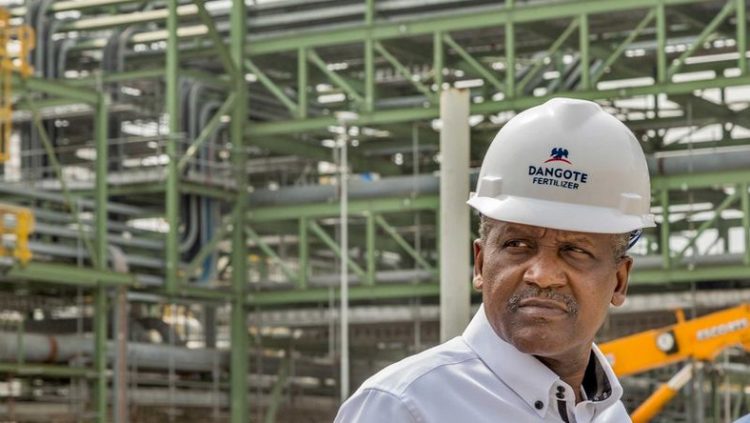BUSINESS

MARKETERS MAY INCUR N14BN LOSS AFTER DANGOTE PETROL PRICE CUT.
New data indicates that the average landing cost of imported petrol is now ₦33.33 higher than Dangote's revised ex-depot price. This shift in price dynamics is expected to benefit the local producer, potentially sidelining fuel importers in the Nigerian market.
Fuel importers may incur a daily loss of ₦466.62 million and a monthly loss of ₦13.998 billion following the recent price reduction in the ex-gantry cost of locally refined petrol by Dangote Petroleum Refinery, according to industry sources.
However, this new financial loss represents an 81% reduction from the losses incurred in March, when importers lost ₦2.5 billion daily and ₦75 billion monthly due to price fluctuations.
The situation is largely driven by a decline in petrol imports and a narrowing price gap between imported and locally refined fuel.
The Dangote Refinery, confirming an exclusive report by our correspondent last Wednesday, announced its third price cut in six weeks, reducing the ex-depot price by ₦30 to ₦835 per litre.
This marks a 3.5% decrease and a ₦45 reduction from the ₦880 per litre price set by the facility the week before.
Industry stakeholders believe this shift could significantly alter Nigeria’s petroleum supply chain, with the Dangote Refinery asserting its influence over pricing and changing the competitive landscape.
As a result, Nigerians will now purchase petrol at the revised prices from the refinery’s partners nationwide, including MRS, AP (Ardova), Heyden, Optima Energy, Hyde, and Tecno Oil.
The statement read, “Dangote Petroleum Refinery is pleased to announce a reduction in the gantry price of Premium Motor Spirit, commonly known as petrol, from N865 to N835, effective from Wednesday, 16th April 2025. This marks the second price reduction within a week.
“Key partners, including MRS, AP (Ardova), Heyden, Optima Energy, Hyde and Tecno Oil, will offer petrol at N890 per litre, down from N920 in Lagos. In the South-West, the price will be N900 per litre, reduced from N930.
“In the North-West and North-Central, the price will be N910 per litre, lowered from N940. In the South-East, South-South, and North-East, the price will be N920 per litre, down from N950.”
Petroleum product marketers have expressed concerns over potential financial losses, indicating they may be forced to sell petrol at a loss due to the recent price drop.
Chinedu Ukadike, the National Publicity Secretary of the Independent Petroleum Marketers Association of Nigeria, acknowledged the positive impact of the adjustment in Dangote Petrol's gantry prices. However, he lamented that marketers with existing stocks will be compelled to sell at a loss.
“It is a good development for Nigerians; however, marketers with the old price stock will have to lose billions of naira. It is affecting marketers, but based on the naira-for-crude, the effect must be reflected in the pump price,” he said.
The Major Energies Marketers Association of Nigeria reported that the landing cost of petrol as of Wednesday, April 16, was N868.33 per litre, which is N33.33 higher than the N835 ex-depot price of PMS at the Dangote refinery.
The Nigerian Midstream and Downstream Petroleum Regulatory Authority recently stated that Nigeria’s daily PMS consumption stands at approximately 50 million litres per day.
Farouk Ahmed, the Chief Executive of the NMDPRA, informed State House correspondents last week that the volume of petrol imports had decreased from 44.6 million litres per day in August 2024 to 14.7 million litres as of April 13, 2025.
He attributed this reduction to the gradual restart of the Port Harcourt Refining Company in November 2024 and the growing production from modular refineries across the nation.
Oil marketers pointed to challenges such as limited access to foreign exchange and price volatility in both local and international markets as factors contributing to the drop in petrol imports.
If 14 million litres of PMS are imported at N868.33 per litre, the total cost would be around N12.17bn.
However, with the new ex-depot price of N835 per litre from Dangote Refinery, the same quantity would cost about N11.69bn, creating a gap of N466.62 million. This results in an estimated monthly loss of approximately N13.998bn.
If dealers are compelled to sell at the lower price, they could face substantial losses.
After Dangote's price reduction announcement, fuel importers warned that dealers may have to sell at a loss, as consumers will likely opt for the cheaper petrol.
Dr. Billy Gillis-Harry, the President of the Petroleum Products Retail Outlets Owners Association of Nigeria, emphasized that the frequent price changes are creating substantial instability in the industry.
The Crude Oil Refinery Owners Association of Nigeria (CORAN) has already predicted that petroleum product importers in the country may eventually be pushed out of business if they fail to align with the growing trend of local refining.
CORAN’s Publicity Secretary, Eche Idoko, noted that despite evident signs that local refining has taken root in Nigeria, many importers continue to cling to their traditional business model.
In the meantime, the Nigerian National Petroleum Company Limited has lowered its price for Premium Motor Spirit to N935 per litre, down from N950.
This new price has been applied at retail stations in areas such as Central Area, Wuse Zone 4, and Kubwa. However, it still remains N20 higher than the N910 per litre that is expected to be sold at MRS filling stations.
"This represents a significant development in our ongoing coverage of current events."— Editorial Board









